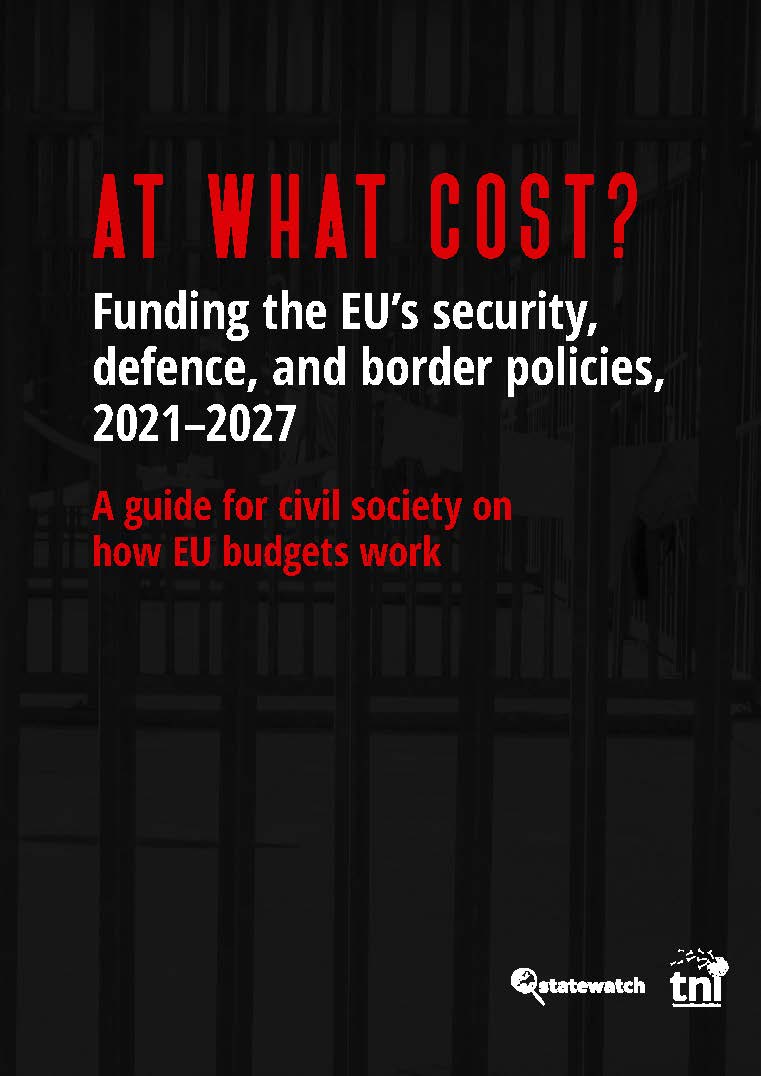European Commission wants to boost border spending by billions of euros
Topic
Country/Region
06 August 2023
In June the European Commission proposed amendments to the EU’s budget for the 2021-27 period, arguing that existing finances are at “the point of exhaustion”. The changes sought by the Commission would increase the budget for “migration and external challenges” by €15 billion.
Support our work: become a Friend of Statewatch from as little as £1/€1 per month.

Image: Images Money, CC BY 2.0
Billions of euros
In its proposal, the Commission states that the EU’s budget needs urgent increases due to “the unprecedented and unexpected challenges that have materialised in 2022, notably the fallout of Russia’s brutal war of aggression against Ukraine and macroeconomic developments.”
Amongst the proposals are plans to increase spending under the heading of “Migration and Border Management” by €1.7 billion, and “Neighbourhood and the World” – which can be used to finance border externalisation projects in third states – by almost €9.7 billion. Elsewhere in the documents, the total amount suggested for “migration and external challenges” is €15 billion.
The increases are required due to “heightened global economic and political instability,” growing global migration, and the “upward trend” of “migratory pressure at the Union borders,” state the documents.
Implementing the Pact
While the documents published as part of the proposals contain few details, the Commission argues that renewed funding for migration and border management is needed for “the implementation of the New Pact on Migration and Asylum will require additional financing, in particular for the screening and border procedure, reception capacity, relocations and returns,” argues the Commission.
This is likely to translate into spending on the infrastructure, equipment and staff required to deal with detaining an increasing number of people at the borders with a view to their swift expulsion, as highlighted by a comment from the Luxembourgish delegation in a recent Council document (pdf) obtained by Statewatch:
“Mindful that only 250MEUR is allocated to AMIF [Asylum, Migration and Integration Fund], but 1000MEUR to BMVI [Border Management and Visa Instrument], please explain why the funds foreseen to reach adequate capacity are earmarked under a fund which does neither provide for the construction of reception infrastructure, nor for the construction of infrastructure outside of border crossing points/area?”
While the proposals are seeking an extra €1.7 billion for migration and border control, the figures provided by the Commission indicate that the current budget commitments on migration and border management do not, overall, exceed the current limits. It appears from the documents that the migration and border management budget line has €306 million available in “unallocated margins” up to 2027.
A number of member states have expressed concern about the proposed budgetary increases, with the German delegation stating in a recent Council document that they “go beyond political and legal obligations,” requiring “a political decision” on whether to approve them or not.
The Dutch authorities state bluntly that they are “not in favour [sic] of introducing new funds,” and that “migration issues” should be “addressed by reprioritization” of existing funds.
Illegality and abuse
Any funding for EU “border management” practices may end up supporting the ongoing illegality and human rights abuses at Europe’s borders: pushbacks in Greece, the harassment and obstruction of search and rescue operations in the Mediterranean, failure to provide access to asylum procedures and the appalling conditions in the “hotspots”.
These issues are not mentioned in the Commission’s proposals. A section on the rule of law notes the budget’s “additional layers of protection in cases when breaches of the rule of law principles affect or risk affecting the EU financial interests,” but as Border Violence Monitoring Network recently pointed out, the Commission does not seem to consider border violence and denial of access to asylum as rule of law issues.
The group states (pdf) that there is a “blatant disregard in the Commission’s [rule of law] reports” regarding “justice systems that fail to “prosecute governmental actors for pushbacks and other violations at borders, that abandon asylum seekers in legal limbo without legal remedies, and that criminalise people on the move and human rights defenders, in the service of a general policy of abuses of fundamental rights.”
Ukrainians and others
The budget proposals demonstrate the stark difference with which the EU has responded to the arrival of millions of refugees from Ukraine compared to those from other states.
The Commission’s communication highlights that “several existing programmes have been repurposed to support Ukraine and address the fallout of the war,” with a total of €17 billion made available “to help Member States support people fleeing from the war or address resulting high energy prices.”
A further €400 million was provided to “frontline Member States… to assist with the first reception and early integration of Ukrainians entering the EU,” while an extra €100 million was provided to the Erasmus+ programme “to support the Ukrainian people, including many children and young people.”
Border externalisation
Those fleeing to the EU from countries other than Ukraine are lumped together in more general statements, with the Commission referring to “migration” having “picked up after the pandemic,” hence the need for extra funding for “reception capacity, relocations and returns.”
Along with this, significant extra funding – €9.7 billion – is proposed for extending the externalisation of borders and migration control:
“Addressing the root causes of migration, improving border management, and maintaining effective migration partnerships with third countries – whether countries of origin and transit, or those hosting large numbers of refugees – will need additional financial support.”
There are budget problems “across the board,” says the Commission, but in particular in “the Southern Neighbourhood countries and Türkiye,” with a particular problem in the latter case being the containment of Syrian refugees in the country.
“The needs regarding Syrian refugees in Türkiye and in the broader region are not decreasing and might increase even further considering the additional challenges following the recent earthquakes,” says the Commission’s communication.
The Commission also needs to guarantee its promises of funding for “the Southern Mediterranean route,” which currently stand at €208 million per year.
Geopolitical considerations are also at play, with the Commission noting that following Russia’s invasion of Ukraine, “it is even more crucial to step up support to our Western Balkans partners, to accelerate convergence with EU Member States and aiming to support stable, prosperous and well-functioning democratic societies on their path towards EU membership.”
One aim of EU support to Western Balkans states is to turn them into a migration buffer zone, with the Croatian Council Presidency arguing in 2020 that states in the region “perceive themselves only as a transit region.”
More military spending
Another focus of the Commission’s proposal is to increase military spending, with the documents arguing that pumping another €1.5 billion into the European Defence Fund “could result in up to EUR 2 billion of investments.”
This aims to “boost the innovation capacity of the European defence technological and industrial base, thus contributing to the Union strategic autonomy.”
Negotiations ongoing
It remains unclear what scale of budgetary increase will be approved. Discussions are ongoing in the Council’s Ad Hoc Working Party on the Multiannual Financial Framework Revision and the Council may, as in the past, water down the Commission’s proposals.
As noted above, the German and Dutch authorities maintain reservations about the plans, but others are more enthusiastic.
The Bulgarian authorities, already the recipients of €45 million in fresh funding for a “pilot project” to speed up deportations and reinforce border controls, argue that “reinforcing border control capabilities and infrastructure should be a priority.”
The Hungarian authorities, always keen to reinforce borders, note that “the proposal only mentions contested ideas about relocation and reception capacity. Why does the proposal not foresee any new funding for the external borders?”
The timeline for negotiations is unclear. The Dutch delegation’s comments in the Council document include the following: “Careful process needed; should by no means be rushed.”
Documentation
European Commission:
- Communication: Mid-term revision of the Multiannual Financial Framework 2021-2027 (COM(2023) 336 final, 20 June 2023)
- Commission Staff Working Document accompanying the communication (SWD(2023) 336 final, 20 June 2023)
- Proposal for a Council Regulation amending Regulation (EU, Euratom) 2020/2093 laying down the multiannual financial framework for the years 2021 to 2027 (COM(2023) 337 final, 20 June 2023)
- Annex to the proposal for a Council Regulation
Council of the EU:
- Multiannual Financial Framework (MFF) 2021-2027 revision - delegations' comments on the Commission proposal to amend the MFF regulation 2021-27 (Council doc. 11650/23, LIMITE, 20 July 2023, pdf)
Our work is only possible with your support.
Become a Friend of Statewatch from as little as £1/€1 per month.
Further reading

Europe’s techno-borders: digital infrastructure for migration control
A new Statewatch/EuroMed Rights publication analyses the past, present and future of Europe’s “techno-borders” – the extensive infrastructure of surveillance systems, databases, biometric identification techniques and information networks put in place over the last three decades to provide authorities with knowledge of – and thus control over – foreign nationals seeking to enter or staying in EU and Schengen territory.

At what cost? Funding the EU’s security, defence, and border policies, 2021–2027
A critical guide for civil society on how EU budgets work. Co-published with the Transnational Institute.
Spotted an error? If you've spotted a problem with this page, just click once to let us know.

